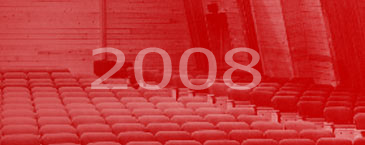 |
|
REVIEWS |
|
 |
On This Page |
Expensive and Expansive Gateway 'Follies'
By LEE DAVIS
Published: May 27, 2008
In most of its first 57 years, the Gateway Playhouse has kicked off its summer season with an easy, small-cast, shake-off-the-winter enterprise. Not this year.
For its 58th year, already overflowing with extravaganzas, the first Gateway show is "The Will Rogers Follies," the Peter Stone-Cy Coleman-Comden and Green musical bio of Will Rogers, framed in a satirically perfect Ziegfeld Follies production.
The Gateway has spared no expense nor left any stops unpulled in its current production. Equal to, if not surpassing (memory is an untrustworthy companion) its previous production of several years ago, this is a must-see show, which looks expensive and seems expansive.
Willa Kim's extravagant costumes follow each other like some mad, over the top and fleshy fashion show; Tony Walton's original lighted staircase is preserved intact and glowing; Tommy Tune's original choreography, executed by director-choreographer DJ Salisbury and an army of young and dashing dancers, is there in spirit and spunk; and Cy Colemen's eclectic mix of Ziegfeldish melodies and country western calmness has never sounded better than in the hands of a fine orchestra conducted by musical director William Foster McDaniel. The whole production is bathed in Marcia Madeira's tasteful and enhancing lighting design.
So what's left? Well, admittedly, the show's first act suffers from a little extension and sagging, as if the creators are marking time between production numbers. But this is more than made up for in a riveting second act that contains a Rogers monologue, delivered to lighten up a Herbert Hoover speech on the onset of the Depression that has more uncomfortable parallels to the present than either Rogers or Peter Stone originally meant. As delivered movingly by Tom Angland as Will Rogers, this speech is riveting and disturbing. The night I attended, you could have heard a pin drop in the audience, whose universal intake of breath wasn't released till the last, ringing syllable.
But that's not the mood of the rest of the show, which is all for fun, and director/choreographer DJ Salisbury keeps it moving at breakneck speed, while filling the stage with his troupe of astounding dancers. The company executes Tommy Tune's showstopping "Our Favorite Son" number of dazzling precision with the same spirit and skill that also stops the Gateway production for cheers.
The small group of principals, are, to a person, once again cast flawlessly by Gateway's casting director Robin Joy Allan. As Ziegfeld's Favorite, Jacqueline Bayne executes her sensual, tongue-in-cheek crossovers with the same éclat that Cady Hoffman used to light the stage of the original and which propelled her into the Ulla role in "The Producers." She's a likable joy.
Dick Decareau, as Clem Rogers (Will's father, both here and in the hereafter), lends a strong singing voice and the fine comic timing of an ace vaudevillian to the proceedings. His every moment on stage is charismatic.
And speaking of strong singing voices-to which must be added rich, embracing and caressing-the other one onstage in this production belongs to Mary Mossberg, as Betty, wife of Will Rogers. She warms up with "My Unknown Someone" in Act One and delivers a strong introduction to the Ziegfeldian excesses of "My Big Mistake," Cy Coleman's triumph of echoing of the era and taste of the Great Glorifier.
But Ms. Mossberg's real triumphal, cheer-inducing moment is her incendiary delivery of the terminally torchy "No Man Left for Me," an agonized, jazzy delivery of an abandoned woman's cry. It stops the show, as it should.
And then there's Tom Angland as Will Rogers himself. Whether twirling a rope, leading an ensemble, or getting down-home and friendly with the audience in several Will Rogers monologues, Mr. Angland fills the personality and persona of Will Rogers with an easy, laid-back skill. His touching delivery of the show's finale, "Never Met a Man I Didn't Like," not necessarily Comden and Green's greatest lyric achievement, is a warm and comforting ending to an evening of pizzazz and pulchritude, delivered by a top-notch cast, at the top of their form. My advice is to go before it leaves us, a little happier and mightily entertained.
That Vegas cowboy still ropes us in
By STEVE PARKS
Published: May 29, 2008
Reason to go see it: Homespun piety collides with hot-pants notoriety. And, oh yeah, you might learn why Will Rogers never met a man he didn't like. (Hint: He never met Adolf Hitler.)
What it's about: As you might guess from the title, it's about Will Rogers, who having died nearly 73 years ago, may be unknown to a couple generations of Americans except as the guy whose foundation passes the hat for do-gooder causes at the movies. But from the early 1920's to the mid-30's, he was the most popular man in America.
In this 1991 Tony winnder for best musical, Will Rogers (Tom Angland) tells his life story as a Ziegfeld Follies act. Will was, in face, a Ziegfeld headliner. He was also a Wild West rope trickster, newspaper columnist, radio personality, movie star, husband, father and, oh yeah, presidential candidate of the Debunk Party. He died at 55 when his airplane nosedived and crashed in Alaska.
Bottom line: Angland, though he has some vocal issues on higher notes, seems so authentic that we almost buy his implausible signature song, "I Never Met a Man I Didn't Like." Never mind the implied sexism. He likes woman just fine, too- especially his true love, Betty, played with impatient adoration by Mary Mossberg. Her "No Man Left for Me" torch song nearly singes the warped honky-tonk piano she drapes herself across. Jacqueline Bayne as Ziegfeld's favorite chorus girl and Dick Decareau as Will's irascible father temper the show's virtue with sultry and salty impertinence, respectively.
But the real star is the glitter of the staircase-to-Vegas set of Tony Walton's original Broadway design and the cowhide-and-rhinestone, barely-there chorus girl costumes of Willa Kim's original Broadway design. The "Will-o-Mania" opening number and its Act II reprise, under the baton of maestro William Foster McDaniel, is a toe-tapping eyeful as directed and choreographed by DJ Salisbury. It's enough to cheer up a dead man, even after his somber Depression-era sermonette.
Although he's been dead all these decades, Will still has plenty to say about current events. And while he never met him, we suspect Will would even like former governor Eliot Spitzer, the target of one of his new jokes.
The will rogers follies at gateway playhouse
By Roy Bradbrook.
Published: June 11, 2008
Will Rogers, who died in 1935, is not a well-known name in 2008. Why, then, is the famous theatrical duo of Betty Comden and Adolph Green writing a show about him? Well, Will Rogers was truly larger than life back in the first decades of the twentieth century. Can you even imagine any of today's superstars having a resume that includes more than 70 movies, writing more than 4,000 daily, syndicated newspaper columns, playing a leading role on Broadway for nearly 10 consecutive years and playing the role of confidante and advisor to numerous presidents?
Well, that was Rogers, the first multi-media superstar. A part-Cherokee boy from Oklahoma, Rogers got into show business by making audiences laugh with his wry, pithy one liners that were always based on the news of the day. His opening line, - "I only know what I read in the newspaper," - showed his insight into the significant events of his time. Rogers became the most read, listened to and watched entertainer in history.
The stage settings at Gateway fully recreated the atmosphere of the legendary Ziegfeld Follies and the showgirls would have certainly pleased Mr. Ziegfeld. Tom Angland brings the homespun, almost self-effacing aspect of Will Rogers to life. Maybe his rope spinning would not get him into a rodeo but he is very believable and sings with a pleasant, country style and creates the persona of someone you would enjoy getting to know - and he made us laugh with some jokes based on today's world. There were occasions when he did not seem too happy singing in the upper registers, but his voice was at it's best when he sang the beautiful, "Look Around."
The ups and downs of Rogers' married life run throughout the show. After marrying Betty Blake, a role excellently played and sung by Mary Mossberg, Rogers battled the strain that a traveling performer's lifestyle places on marriage. And boy did Will Rogers travel. He loved to fly with the leading pilot of his day, Wiley Post, played by John Simpson. Throughout the play Wiley appears, in the audience from time to time, suggesting to Will, "Let's Go Flying" and in the end they do, but with a fatal result.
The interesting structure of the show, written as a blend of third wall ruptures and stage dialogue, works well in the talented actors' hands. Apart from Will and Betty, other major roles are Will's father, played by Dick Decareau, who is portrayed in his living form and also makes an after death appearance. Decareau hits all the right notes with some corny humor and a lot of personality. Similarly, Jacqueline Bayne as one of Ziegfeld's "favorites" is pretty and funny. As Will relates how he has been approached to run for president, he and the girls perform "Favorite Son," an intricate number, full of hand and leg movements and slapping that could have been disastrous, but really is a showstopper. Another memorable scene is when Betty sings a moving torch song lamenting her husband who is often away. Mossberg really showed a great vocal range and depth of feeling as she sang 'No Man Left for me."
By the end of the show, the audience is content with having been entertained by the story of a very remarkable man. Will Rogers proved to be a unique figure in the entertainment business. It's doubtful that today anyone in the entertainment field could excel in so many fields ever again.








